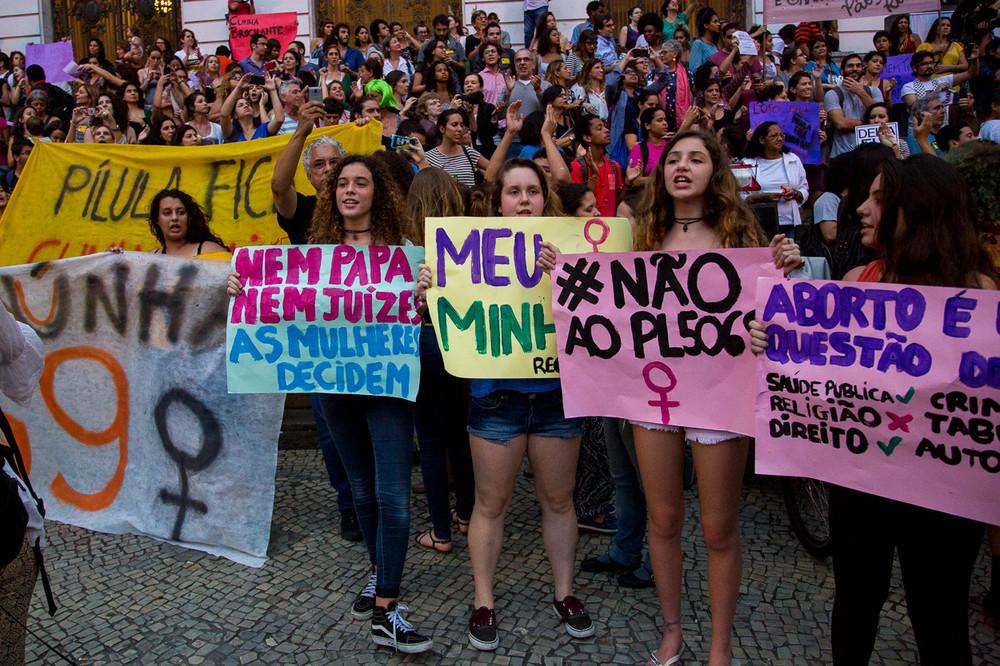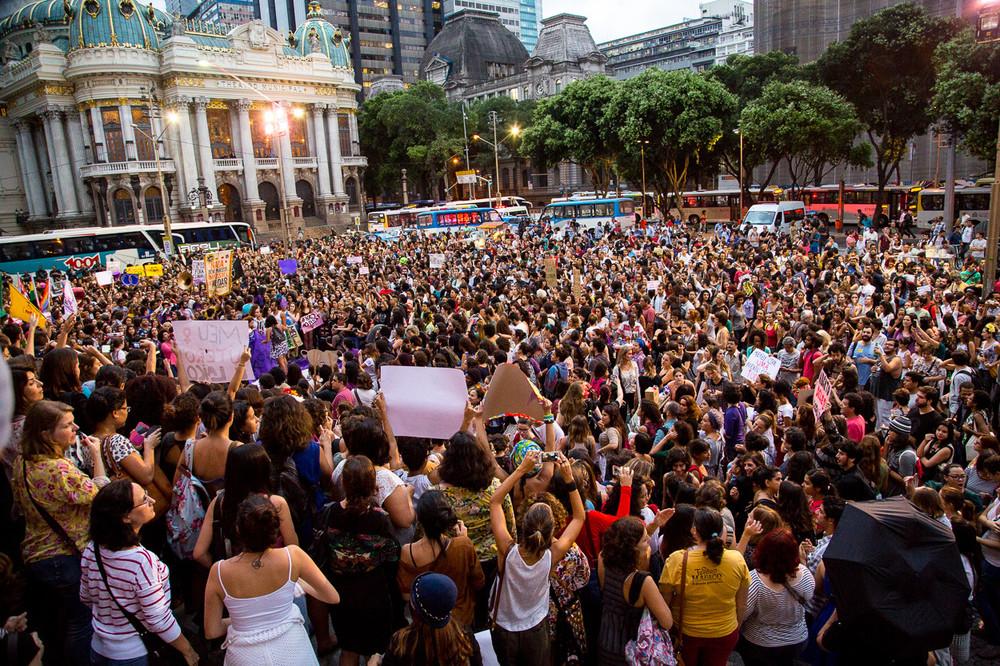Yasmin Curzi, Rio de Janeiro, Brazil, SSH Blog Correspondent

Rio de Janeiro is the second largest city in Brazil with over 6 million inhabitants and while more than half are women, there is not much incorporation of gender in the public policy.
Democracy in Brazil is a delicate theme. In short, we have been under several dictatorships in our recent history and the political system is mostly formed by oligarchies. After the struggles of democratic transition in the late 1980’s, our modern Federal Constitution – also known as “Civic Constitution” – reflected a lot of social movement’s concerns and intended to amplify decision-making procedures to the civil society. Still, the Civic Constitution is not effective enough to change the concentration of political and economical power held in the hands of a few rich white men, men who still predominantly run the public institutions.

As a result of Brazil’s historical exclusion of women (they are misrepresented in the legislature and the decision making processes are failing to consider popular agendas), the main public institutions neglect women’s issues. This challenging scenario of gender inequality in politics inherently affects the public policy choices of the country.
In the past two decades, the Federal Government took important measures observing the platform that was defined at the World Conference on Women held in Beijing in 1995. Significantly, Beijing’s agenda observes the necessity of women’s empowerment by the opening of decision-making processes to their participation and the incorporation of gender’s perspective in all public policies. In order to attend these directions, the Brazilian Federal Secretariat for Women’s Policies was created in 2013. It plays a key role encouraging states and municipal administrations to create and implement public policies that reduce inequalities between women and men. The “National Plan of Women’s Policies” formulated by this Federal Secretariat serves as an orientation guide to others federal entities that should, in turn, create more specific measures aiming to attend women’s particular needs in their locations. However, until today, Rio de Janeiro doesn’t have a Municipal Plan.
In Rio, gender inequality is mostly perceived by cases of material violence. According to the “Women Dossier”[1], women registered 56.031 occurrences of physical injuries in the year of 2014, and the estimate of domestic abuse is almost 80 daily cases. In cases of attempted murder, 33,8% of the defendants are the victim’s partners or ex-partners and 3,8% are the victim’s fathers or stepfathers. Even with these significant numbers, in the whole city there are only five attention houses for victims of domestic abuse. In this same year, 4.725 women registered occurrence for rape. And we can say that these data are under-representative, as there are a lot of constraints that inhibit women from seeking institutional help. In cases of sexual harassment, rape or abuse, the institutions are often unwelcoming to the victims: police officers commonly question the victim’s behavior and even the creation of Rio de Janeiro’s Women Protection Police Precinct[2] isn’t effective to mitigate this scenario.
When it comes to street harassment, an online survey[3] of nearly 8,000 people conducted by the journalist Karin Hueck, a member of the NGO “Fiu Fiu Enough”, discovered that 99,6% of theses women had suffered some kind of harassment in public spaces at some point of their lives. They said it limits their freedoms, like clothing and mobility choices. 90% had said they changed their way of dressing because they feared suffering with harassment and 81% gave up the idea of going somewhere alone. Just 17% had said they liked the catcalls. Other research[4], conducted by the NGO ActionAid, interviewed 503 women[5] and 86% said they had experienced street harassment. Even with this clear evidence of a problem, there’s no public policy against street harassment.
In conclusion, the invisibility of women’s issues and the lack of appropriate treatment of their concerns stems from women’s under-representation in political institutions. Women need to be heard in the formulation and implementation of policies and programs that concern them. The fact that the city of Rio de Janeiro doesn’t have any public policy plan directed at women’s issues is a dramatic sign of the persistent situation of our exclusion from the public sphere. The oligarchies that constitute political power in Rio de Janeiro nowadays treat female matters as irrelevant and, apparently, don’t intend to expand the civil society channels. To overcome this scenario, women need to fight for their fair distribution of political power and occupy institutions of public life.
[1] A public research that reunites data about violence against women, published in 2015.
[2] This type of Precinct was created to give specialized attention to women. Although, there’re only 300 unities in a country that has 5.561 cities. The infrastructure of these precincts is also a questionable theme: mostly doesn’t have social assistants, neither psychologies, or orientation of women toward their rights.
[3] You can access the partial results from this survey in this link: http://thinkolga.com/2013/09/09/chega-de-fiu-fiu-resultado-da-pesquisa/
[4] You can access an article about this research in this link: http://agenciabrasil.ebc.com.br/en/direitos-humanos/noticia/2016-05/survey-shows-86-brazilian-women-have-experienced-street-harassment
[5] The sample was constructed trying to reflect the Brazilian demographics, as exposed in the last census from Brazilian Institute of Geography and Statistics (IBGE).
References:
CURZI, Yasmin and RADD, Carolina. “Política para Mulheres” in: “O Rio que Queremos: propostas para uma cidade inclusiva”. Disponible at: <http://www.grabois.org.br/uploads/arquivos/1484084673.pdf>
PINTO, Andréia Soares, MONTEIRO, Joana e MORAES, Orlinda Claudia R. “Dossiê Mulher”. Instituto de Segurança Pública – Rio de Janeiro, 2015. Available at: <http://arquivos.proderj.rj.gov.br/isp_imagens/uploads/DossieMulher2015.pdf>
Yasmin is a Research Assistant at the Center for Research on Law and Economics at FGV-Rio. She has a BA in Social Sciences from FGV-Rio and a Master Degree in Social Sciences from PUC-Rio, where she wrote her thesis on street harassment and feminists’ struggles for recognition.
